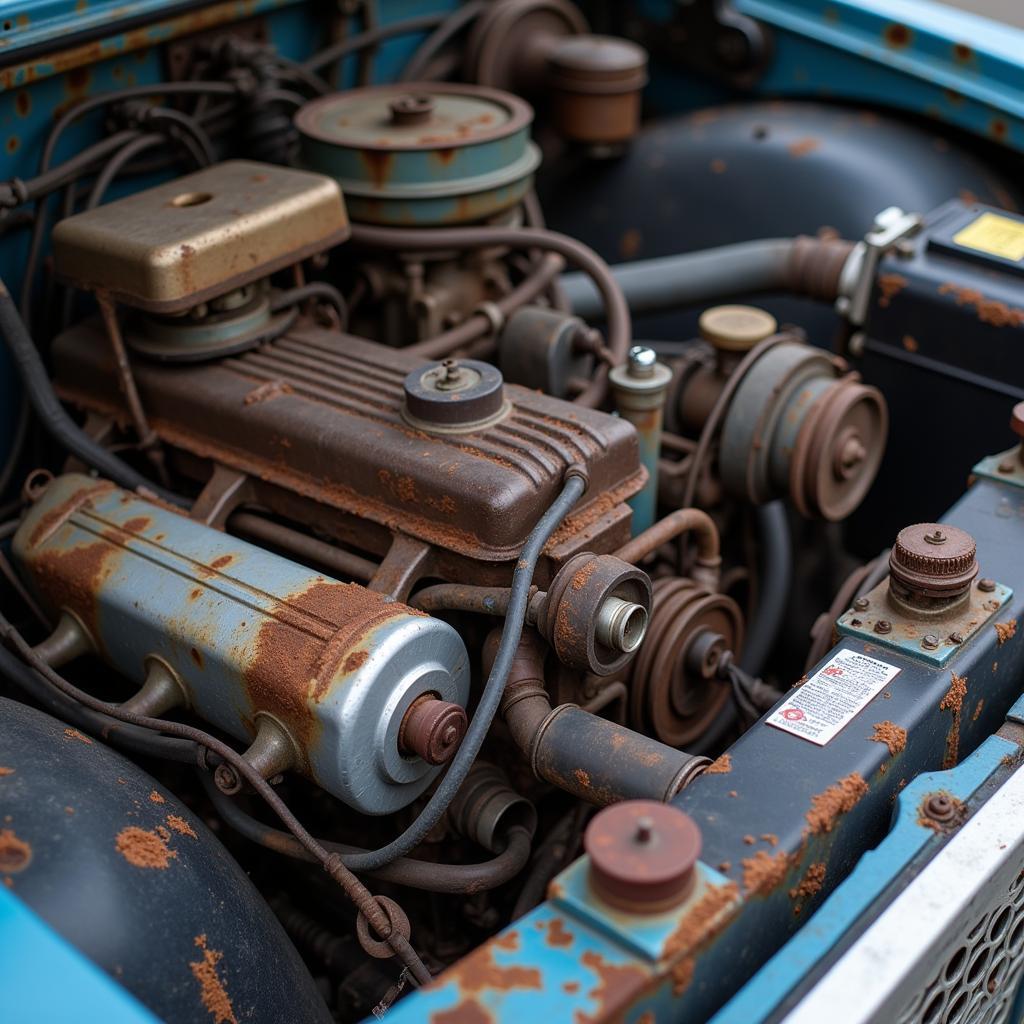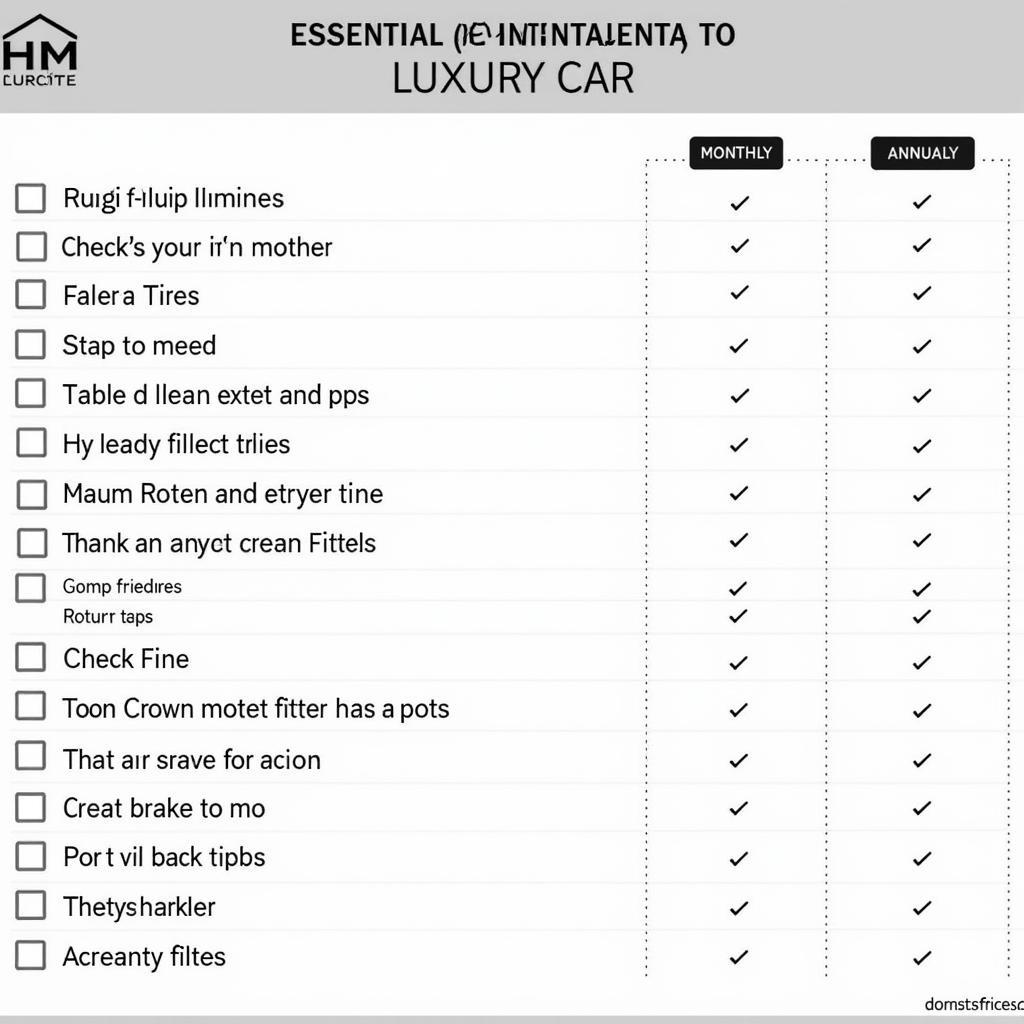It’s a common question, and one that many car owners wonder about: Can You Fix Cars From Home? The answer, like many things in the automotive world, is a bit more complex than a simple yes or no. While some repairs are definitely doable in your own driveway, others require specialized tools, knowledge, and even licensing.
This guide will break down the ins and outs of DIY car repairs, helping you determine which repairs are best tackled at home and which are better left to professionals.
What Car Repairs Can You Do From Home?
Let’s start with the good news: there are a lot of car maintenance tasks and minor repairs that are perfectly within the realm of home mechanics. Here are a few examples:
- Oil changes: This is a classic DIY project and one of the most common maintenance tasks for car owners.
- Replacing air filters: These are relatively inexpensive and easy to replace, and can have a noticeable impact on your car’s performance.
- Checking fluids: Keeping an eye on your car’s fluids (like coolant, brake fluid, and transmission fluid) is crucial for maintaining its health. You can easily check these levels and top them off as needed.
- Replacing wiper blades: Worn-out wiper blades can make driving in the rain a dangerous hassle, but replacing them is a quick and easy fix.
- Changing light bulbs: From headlights to taillights, changing bulbs is a simple and cost-effective way to keep your car safe and visible on the road.
- Tire rotations: Rotating your tires regularly ensures even wear and tear, prolonging their lifespan.
- Simple electrical fixes: Basic electrical work like replacing fuses and checking battery terminals can be done at home with some caution and basic tools.
How To Determine If You Can Fix Your Car From Home
Before diving into any repair, take a few minutes to assess the situation:
1. Identify the Problem: Start by pinpointing the exact issue. If you’re unsure, try to find a trustworthy online resource, repair manual, or forum to help you diagnose the problem.
2. Assess Your Skill Level: Be honest with yourself about your mechanical abilities and experience. Some repairs require more technical knowledge and experience than others.
3. Consider the Risk and Complexity: Some repairs are more complex than others. Take into account the potential for damage or injury.
4. Determine The Cost: Calculate the cost of parts and tools. Factor in your time. Sometimes, even with free labor, it’s more cost-effective to take your car to a professional.
5. Understand Your Local Laws and Regulations: In some areas, there might be restrictions on DIY car repairs.
DIY Car Repairs: Tips and Best Practices
If you decide to take on a DIY car repair, here are some essential tips to keep in mind:
1. Safety First: Always prioritize safety. Wear protective gear, work in a well-ventilated area, and never try to repair a car while it’s running.
2. Gather the Right Tools: Make sure you have the right tools for the job. This might require investing in some basic tools.
3. Use Repair Manuals: Consult a reliable repair manual, specific to your car’s model and year. These manuals provide detailed instructions and diagrams.
4. Start Small and Build Confidence: If you’re new to car repairs, start with simple tasks. Building confidence with easier repairs will help you tackle more complex tasks later.
5. Take Your Time and Be Patient: Don’t rush the process. Take your time, follow the instructions carefully, and double-check your work.
6. Don’t Be Afraid to Ask for Help: There are plenty of online forums and communities of home mechanics where you can get advice, tips, and support.
What Car Repairs Are Best Left to Professionals?
While some repairs are doable at home, others are best left to the experts. This includes:
- Major engine repairs: Repairs involving the engine, transmission, or complex electrical systems are best left to professionals.
- Bodywork and Painting: Collision repairs, bodywork, and painting require specialized skills and equipment.
- Airbag Systems: Airbag systems are complex and potentially dangerous. It’s essential to have them inspected and repaired by a qualified technician.
- Brakes: Brakes are a crucial safety feature. If you’re unsure about your ability to repair them safely and effectively, it’s better to have them serviced by a professional.
- Emissions Systems: Emissions systems are regulated by law. Improper repairs could result in costly fines and legal issues.
Can You Fix Cars From Home? The Final Word
You can certainly fix cars from home, and many do, but it’s essential to assess the situation carefully before taking on any repair. Do your research, know your limits, and prioritize safety. If you’re ever unsure, don’t hesitate to consult a professional.
“There’s a certain pride and satisfaction that comes with knowing you can take care of your own car,” says James Wilson, a seasoned mechanic and owner of his own auto repair shop. “But it’s important to remember that not every repair is meant to be a DIY project. Sometimes, it’s best to trust the experts.”
“As a seasoned mechanic, I’ve seen my fair share of home repair attempts that haven’t gone quite as planned,” says Emily Rodriguez, a certified automotive technician with over a decade of experience. “If you’re not comfortable with the level of complexity or the potential for damage, it’s always better to err on the side of caution and consult a professional.”
Need Help With Your Car? Contact Autotippro Today!
We understand that dealing with car repairs can be stressful. Let us take care of your vehicle, so you can focus on what matters most.
We are a team of highly skilled and experienced technicians dedicated to providing exceptional car repair services. We use the latest technology and techniques to ensure your vehicle is repaired correctly and efficiently.
Contact us today for a free estimate!
Phone: +1 (641) 206-8880
Office: 500 N St Mary’s St, San Antonio, TX 78205, United States
FAQ
Q: What are the most common car repairs that homeowners tackle?
A: The most common DIY repairs include oil changes, air filter replacements, fluid checks, and replacing wiper blades.
Q: What are some essential tools for home car repairs?
A: Some basic tools include a jack, wrench set, screwdrivers, pliers, and a socket set.
Q: Can I use YouTube videos to learn how to fix my car?
A: While YouTube videos can be a useful resource, it’s important to find reliable sources and proceed with caution.
Q: What should I do if I’m not comfortable with a repair?
A: If you’re not confident in your abilities, consult a professional mechanic.
Q: Is it safe to repair a car with the engine running?
A: No, it’s never safe to repair a car with the engine running. Always turn off the engine and engage the parking brake before working on your vehicle.






Leave a Reply